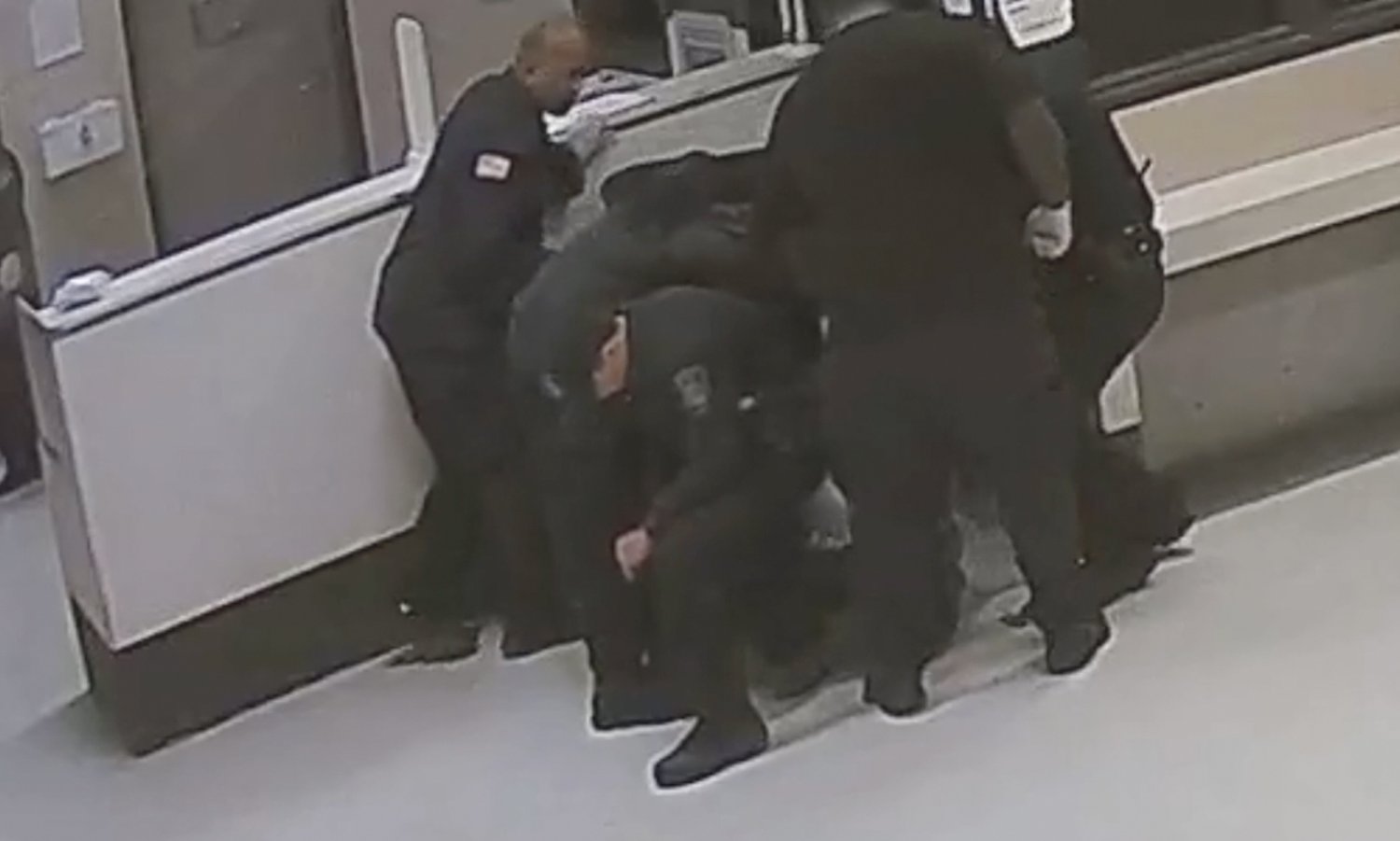Mississippi Today
Grenada officers can be sued in jail death, judge rules

Grenada officers can be sued in jail death, judge rules
A federal judge rejected the claim that Grenada police officers should be protected by qualified immunity in the 2018 death of Robert Loggins in the local jail.
The ruling by U.S. District Judge Sharion Aycock moves the case one step closer to trial in Mississippi.
“The court’s decision is an important milestone in the family’s quest for justice, and they are prepared to fight for as long as it takes,” said Jacob Jordan of the Levy Konigsberg LLP law firm, the attorney for Loggins’ family.
A video obtained by the Mississippi Center of Investigative Reporting at Mississippi Today shows Loggins rolling when officers and jailers piled on top of him inside the Grenada County Jail. It also shows officer kneeling on his neck.
Three and a half minutes later, they got off of him. He never moved again. More than six minutes passed before anyone checked his pulse or breathing.
Despite that, the state of Mississippi concluded Loggins’ death was an “accident.” The alleged culprit? Methamphetamine toxicity.
After viewing the video as well as the autopsy report and the photos, renowned forensic pathologist Dr. Michael Baden concluded the death was a homicide. “They killed him by piling on top of him,” he said. “He absolutely died from some kind of asphyxia.”
Loggins’ death came two years before the 2020 murder of George Floyd. All the officers who played a role in Floyd’s homicide were fired and convicted on criminal charges.
Minneapolis police officer Derek Chauvin, who knelt on Floyd’s neck, was sentenced to two decades behind bars. Three other officers were each sentenced to between two and a half and three and a half years in prison, including one officer who kept bystanders away.
The Grenada officer who kneeled on Loggins’ neck has never faced any criminal charges, nor has any other officer.
Baden considers the officers’ actions in the Loggins’ case much worse. “The intentional brutality inflicted on Loggins,” he said, “who was in an acute mental crisis, having done nothing criminal, makes his death — and many, many others — so much more criminal than Floyd’s.”
Baden compared the Loggins’ case to the Jan. 10 death of Tyre Nichols, whom five Memphis police officers pepper-sprayed, kicked, punched and shocked with a Taser. A grand jury has indicted the now-fired officers on second-degree murder and other charges.
The pathologist said Loggins’ death is “more typical of the thousands of police custody deaths of unarmed persons that have occurred without much notice.”
Since 2000, at least 342 deaths have taken place across the country after police restrained people, according to FatalEncounters.org. Many of those deaths were due to asphyxia.
In some of those deaths, officers used restraints condemned by the U.S. Department of Justice. The agency, along with the International Association of Chiefs of Police, warned officers that keeping restrained people face down increases the risk of death from asphyxia.
“As soon as the suspect is handcuffed, get him off his stomach,” the memo advises.
At 5:40 a.m. on Nov. 29, 2018, a woman in Grenada telephoned 911, saying, “Someone’s in the back of my house calling for help. Please hurry.”
Five members of the Grenada Police Department responded: Capt. Justin Gammage, Sgt. Reggie Woodall, Cpl. Edwin Merriman, Patrolman Michael Jones and Patrolman Albert Deane Tilley.
They found a Black man face down with his arms tucked beneath his body. One officer recognized Loggins, who had battled both mental issues and a drug problem.
“Although Loggins was likely guilty of trespassing and disturbing the peace, there is no real contention that he had committed any offense more serious than those,” the judge wrote. “In fact, according to the call to Grenada Police Department, Loggins was screaming for help, which would undercut any argument that he was attempting to commit some sort of serious crime under cover of night.”

In bodycam footage obtained by MCIR, officers repeatedly asked Loggins to put his hands behind his back. He refused.
“My soul belongs to Jesus Christ, my savior, my protector,” he told officers.
“Your ass belongs to us now,” one of them replied.
The judge concluded that “any fears the officers may have had must have subsided quickly. Loggins was screaming incoherently, never attempted to exert any force against them, never brandished a weapon and never even threatened to harm them.”
She wrote that Loggins refused to put his hands behind his back, which may have been because he was in an altered state.
Gammage and Woodall shocked Loggins with a Taser at least 10 times, and Woodall struck Loggins with a flashlight nine times — a degree of force that “was not justifiable under the circumstances,” the judge wrote.
After handcuffing the 5-foot-8, 190-pound man, officers carried him to a carport, where a report by the Mississippi Bureau of Investigation claims that “Loggins’ disorderly behavior” kept emergency personnel from conducting “a full medical assessment.”
But bodycam video paints a different picture. As officers carry Loggins, an EMT can be heard saying, “He looks fine to me.”
Jail videoshows that at 5:59 a.m. officers carried Loggins upside down into the lobby of the jail. They left him face down on the floor, handcuffed.
He seemed to be in distress, rolling from side to side, the shift supervisor, Sgt. Edna Clark, told the investigations bureau. “To me, he was trying to gasp for breath because he couldn’t breathe.”
She said she asked officers to take Loggins tothe hospitalbut was waved off.
After Tilley reportedly said he needed his handcuffs back, at least four officers and jailers piled on top of Loggins at 6:04 a.m. to remove the cuffs from his wrists, the video shows. When they got off Loggins more than three minutes later, he didn’t move.
Clark noticed that he was bleeding and called 911. The dispatcher replied that EMTs had previously checked him.
“He’s bleeding from his mouth. He’s bleeding from his legs,” she told the dispatcher. “I’m not going to take him.”
At 6:14 a.m., Clark checked Loggins’ pulse and his breathing. She called 911 again.
“This man has got no heartbeat, and he’s not breathing. I want them officers back over here. I want an ambulance,” she said. “Get them over here now.”
A few minutes later, medical personnel arrived. They pounded on Loggins’ chest hoping to revive him, and when they couldn’t, they airlifted him to a hospital, where he was pronounced dead.
In 2020, Loggins’ wife, Rika Jones, filed a lawsuit in U.S. District Court, accusing the officers of assault and the medical personnel and the private jail operator of failing to provide him with proper medical treatment.
Tilley’s lawyer insists his client didn’t cause Loggins’ death or act with excessive force and is shielded by qualified immunity, a legal doctrine that says government workers can’t be held liable for what they do on the job, except in rare circumstances.
Other officers have also denied any wrongdoing, insisting that Loggins’ constitutional rights were never violated.
The judge, however, disagreed, concluding that officers used “excessive force” and weren’t entitled to immunity from litigation.
In its response, the private jail operator, Corrections Management Services, said its staff acted in good faith, with Clark advising police “multiple times that Loggins would not be accepted into the jail and that he needed medical attention.” Medical personnel have denied the suit’s allegations of failure to provide proper treatment.
When Loggins died, he was 26 — seven years younger than his mother was when she died.
Debbie Loggins died in police custody after being hogtied, another restraint that the Justice Department has condemned.

The late pathologist who conducted her autopsy, Dr. Steven Hayne, ruled out trauma, drugs and alcohol, concluding that she died because of advanced heatstroke, even though the sun hadn’t risen when she was arrested, the temperature was in the 70s, and officers transported her in an air-conditioned car.
Instead, Hayne — whose autopsies have beencalled into question— concluded her death was an accident, blaming her “excessive exertional activity.”
Loggins’ father, Robert Ford, still passes by the jail where his son breathed his last. Sometimes, he stops outside and thinks about his son.
He believes his son deserves justice. “He was murdered,” he said. “You can see it in the video.”
This article first appeared on Mississippi Today and is republished here under a Creative Commons license.
Did you miss our previous article…
https://www.biloxinewsevents.com/?p=224359
Mississippi Today
Mississippi River flooding Vicksburg, expected to crest on Monday
Warren County Emergency Management Director John Elfer said Friday floodwaters from the Mississippi River, which have reached homes in and around Vicksburg, will likely persist until early May. Elfer estimated there areabout 15 to 20 roads underwater in the area.
“We’re about half a foot (on the river gauge) from a major flood,” he said. “But we don’t think it’s going to be like in 2011, so we can kind of manage this.”
The National Weather projects the river to crest at 49.5 feet on Monday, making it the highest peak at the Vicksburg gauge since 2020. Elfer said some residents in north Vicksburg — including at the Ford Subdivision as well as near Chickasaw Road and Hutson Street — are having to take boats to get home, adding that those who live on the unprotected side of the levee are generally prepared for flooding.



“There are a few (inundated homes), but we’ve mitigated a lot of them,” he said. “Some of the structures have been torn down or raised. There are a few people that still live on the wet side of the levee, but they kind of know what to expect. So we’re not too concerned with that.”
The river first reached flood stage in the city — 43 feet — on April 14. State officials closed Highway 465, which connects the Eagle Lake community just north of Vicksburg to Highway 61, last Friday.

Elfer said the areas impacted are mostly residential and he didn’t believe any businesses have been affected, emphasizing that downtown Vicksburg is still safe for visitors. He said Warren County has worked with the U.S. Army Corps of Engineers and the Mississippi Emergency Management Agency to secure pumps and barriers.
“Everybody thus far has been very cooperative,” he said. “We continue to tell people stay out of the flood areas, don’t drive around barricades and don’t drive around road close signs. Not only is it illegal, it’s dangerous.”
NWS projects the river to stay at flood stage in Vicksburg until May 6. The river reached its record crest of 57.1 feet in 2011.




This article first appeared on Mississippi Today and is republished here under a Creative Commons Attribution-NoDerivatives 4.0 International License.![]()
Mississippi Today
With domestic violence law, victims ‘will be a number with a purpose,’ mother says
Joslin Napier. Carlos Collins. Bailey Mae Reed.
They are among Mississippi domestic violence homicide victims whose family members carried their photos as the governor signed a bill that will establish a board to study such deaths and how to prevent them.
Tara Gandy, who lost her daughter Napier in Waynesboro in 2022, said it’s a moment she plans to tell her 5-year-old grandson about when he is old enough. Napier’s presence, in spirit, at the bill signing can be another way for her grandson to feel proud of his mother.
“(The board) will allow for my daughter and those who have already lost their lives to domestic violence … to no longer be just a number,” Gandy said. “They will be a number with a purpose.”
Family members at the April 15 private bill signing included Ashla Hudson, whose son Collins, died last year in Jackson. Grandparents Mary and Charles Reed and brother Colby Kernell attended the event in honor of Bailey Mae Reed, who died in Oxford in 2023.
Joining them were staff and board members from the Mississippi Coalition Against Domestic Violence, the statewide group that supports shelters and advocated for the passage of Senate Bill 2886 to form a Domestic Violence Facility Review Board.
The law will go into effect July 1, and the coalition hopes to partner with elected officials who will make recommendations for members to serve on the board. The coalition wants to see appointees who have frontline experience with domestic violence survivors, said Luis Montgomery, public policy specialist for the coalition.
A spokesperson from Gov. Tate Reeves’ office did not respond to a request for comment Friday.
Establishment of the board would make Mississippi the 45th state to review domestic violence fatalities.
Montgomery has worked on passing a review board bill since December 2023. After an unsuccessful effort in 2024, the coalition worked to build support and educate people about the need for such a board.
In the recent legislative session, there were House and Senate versions of the bill that unanimously passed their respective chambers. Authors of the bills are from both political parties.
The review board is tasked with reviewing a variety of documents to learn about the lead up and circumstances in which people died in domestic violence-related fatalities, near fatalities and suicides – records that can include police records, court documents, medical records and more.
From each review, trends will emerge and that information can be used for the board to make recommendations to lawmakers about how to prevent domestic violence deaths.
“This is coming at a really great time because we can really get proactive,” Montgomery said.
Without a board and data collection, advocates say it is difficult to know how many people have died or been injured in domestic-violence related incidents.
A Mississippi Today analysis found at least 300 people, including victims, abusers and collateral victims, died from domestic violence between 2020 and 2024. That analysis came from reviewing local news stories, the Gun Violence Archive, the National Gun Violence Memorial, law enforcement reports and court documents.
Some recent cases the board could review are the deaths of Collins, Napier and Reed.
In court records, prosecutors wrote that Napier, 24, faced increased violence after ending a relationship with Chance Fabian Jones. She took action, including purchasing a firearm and filing for a protective order against Jones.
Jones’s trial is set for May 12 in Wayne County. His indictment for capital murder came on the first anniversary of her death, according to court records.
Collins, 25, worked as a nurse and was from Yazoo City. His ex-boyfriend Marcus Johnson has been indicted for capital murder and shooting into Collins’ apartment. Family members say Collins had filed several restraining orders against Johnson.
Johnson was denied bond and remains in jail. His trial is scheduled for July 28 in Hinds County.
He was a Jackson police officer for eight months in 2013. Johnson was separated from the department pending disciplinary action leading up to immediate termination, but he resigned before he was fired, Jackson police confirmed to local media.
Reed, 21, was born and raised in Michigan and moved to Water Valley to live with her grandparents and help care for her cousin, according to her obituary.
Kylan Jacques Phillips was charged with first degree murder for beating Reed, according to court records. In February, the court ordered him to undergo a mental evaluation to determine if he is competent to stand trial, according to court documents.
At the bill signing, Gandy said it was bittersweet and an honor to meet the families of other domestic violence homicide victims.
“We were there knowing we are not alone, we can travel this road together and hopefully find ways to prevent and bring more awareness about domestic violence,” she said.
This article first appeared on Mississippi Today and is republished here under a Creative Commons Attribution-NoDerivatives 4.0 International License.
Mississippi Today
Court to rule on DeSoto County Senate districts with special elections looming
A federal three-judge panel will rule in coming days on how political power in northwest Mississippi will be allocated in the state Senate and whether any incumbents in the DeSoto County area might have to campaign against each other in November special elections.
The panel, comprised of all George W. Bush-appointed judges, ordered state officials last week to, again, craft a new Senate map for the area in the suburbs of Memphis. The panel has held that none of the state’s prior maps gave Black voters a realistic chance to elect candidates of their choice.
The latest map proposed by the all-Republican State Board of Election Commissioners tweaked only four Senate districts in northwest Mississippi and does not pit any incumbent senators against each other.
The state’s proposal would keep the Senate districts currently held by Sen. Michael McLendon, a Republican from Hernando and Sen. Kevin Blackwell, a Republican from Southaven, in majority-white districts.
But it makes Sen. David Parker’s district a slightly majority-Black district. Parker, a white Republican from Olive Branch, would run in a district with a 50.1% black voting-age population, according to court documents.
The proposal also maintains the district held by Sen. Reginald Jackson, a Democrat from Marks, as a majority-Black district, although it reduces the Black voting age population from 61% to 53%.
Gov. Tate Reeves, Secretary of State Michael Watson, and Attorney General Lynn Fitch comprise the State Board of Election Commissioners. Reeves and Watson voted to approve the plan. But Watson, according to meeting documents, expressed a wish that the state had more time to consider different proposals.
Fitch did not attend the meeting, but Deputy Attorney General Whitney Lipscomb attended in her place. Lipscomb voted against the map, although it is unclear why. Fitch’s office declined to comment on why she voted against the map because it involves pending litigation.
The reason for redrawing the districts is that the state chapter of the NAACP and Black voters in the state sued Mississippi officials for drawing legislative districts in a way that dilutes Black voting power.
The plaintiffs, represented by the ACLU, are likely to object to the state’s newest proposal, and they have until April 29 to file an objection with the court
The plaintiffs have put forward two alternative proposals for the area in the event the judges rule against the state’s plans.
The first option would place McLendon and Blackwell in the same district, and the other would place McLendon and Jackson in the same district.
It is unclear when the panel of judges will issue a ruling on the state’s plan, but they will not issue a ruling until the plaintiffs file their remaining court documents next week.
While the November election is roughly six months away, changing legislative districts across counties and precincts is technical work, and local election officials need time to prepare for the races.
The judges have not yet ruled on the full elections calendar, but U.S. Fifth Circuit Court of Appeals Judge Leslie Southwick said at a hearing earlier this month that the panel was committed have the elections in November.
This article first appeared on Mississippi Today and is republished here under a Creative Commons Attribution-NoDerivatives 4.0 International License.
-

 News from the South - Florida News Feed6 days ago
News from the South - Florida News Feed6 days agoJim talks with Rep. Robert Andrade about his investigation into the Hope Florida Foundation
-

 News from the South - Virginia News Feed7 days ago
News from the South - Virginia News Feed7 days agoHighs in the upper 80s Saturday, backdoor cold front will cool us down a bit on Easter Sunday
-

 News from the South - Arkansas News Feed7 days ago
News from the South - Arkansas News Feed7 days agoValerie Storm Tracker
-

 News from the South - Kentucky News Feed7 days ago
News from the South - Kentucky News Feed7 days agoU.S. Supreme Court pauses deportations under wartime law
-

 News from the South - Alabama News Feed4 days ago
News from the South - Alabama News Feed4 days agoPrayer Vigil Held for Ronald Dumas Jr., Family Continues to Pray for His Return | April 21, 2025 | N
-

 Mississippi Today5 days ago
Mississippi Today5 days ago‘Trainwreck on the horizon’: The costly pains of Mississippi’s small water and sewer systems
-

 News from the South - Texas News Feed5 days ago
News from the South - Texas News Feed5 days agoMeteorologist Chita Craft is tracking a Severe Thunderstorm Warning that's in effect now
-

 Mississippi Today7 days ago
Mississippi Today7 days agoOn this day in 1977, Alex Haley awarded Pulitzer for ‘Roots’














































